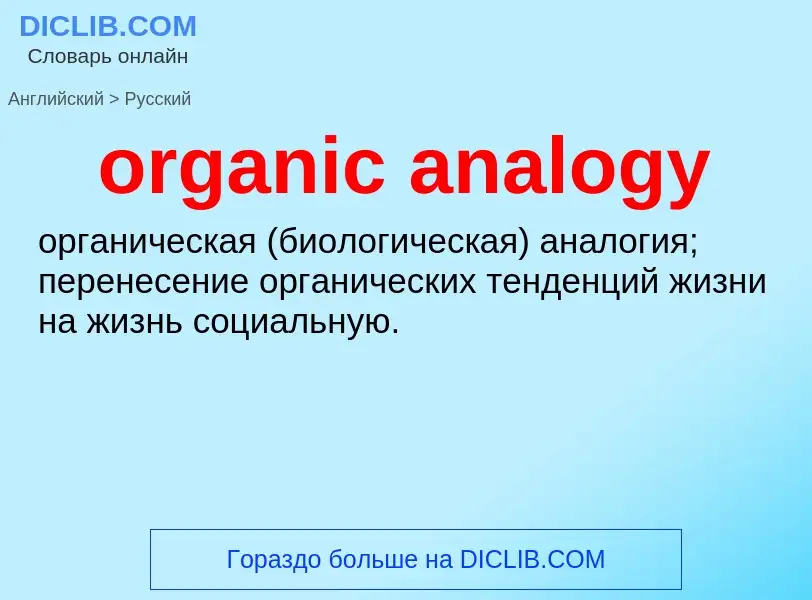ترجمة وتحليل الكلمات عن طريق الذكاء الاصطناعي ChatGPT
في هذه الصفحة يمكنك الحصول على تحليل مفصل لكلمة أو عبارة باستخدام أفضل تقنيات الذكاء الاصطناعي المتوفرة اليوم:
- كيف يتم استخدام الكلمة في اللغة
- تردد الكلمة
- ما إذا كانت الكلمة تستخدم في كثير من الأحيان في اللغة المنطوقة أو المكتوبة
- خيارات الترجمة إلى الروسية أو الإسبانية، على التوالي
- أمثلة على استخدام الكلمة (عدة عبارات مع الترجمة)
- أصل الكلمة
organic analogy - ترجمة إلى الروسية
медицина
органическое вещество
تعريف
ويكيبيديا
Organicism is the philosophical position that states that the universe and its various parts (including human societies) ought to be considered alive and naturally ordered, much like a living organism. Vital to the position is the idea that organicistic elements are not dormant "things" per se but rather dynamic components in a comprehensive system that is, as a whole, everchanging. Organicism is related to but remains distinct from holism insofar as it prefigures holism; while the latter concept is applied more broadly to universal part-whole interconnections such as in anthropology and sociology, the former is traditionally applied only in philosophy and biology. Furthermore, organicism is incongruous with reductionism because of organicism's consideration of "both bottom-up and top-down causation." Regarded as a fundamental tenet in natural philosophy, organicism has remained a vital current in modern thought, alongside both reductionism and mechanism, that has guided scientific inquiry since the early 17th century.
Though there remains dissent among scientific historians concerning organicism's pregeneration, most scholars agree on Ancient Athens as its birthplace. Surfacing in Athenian writing in the 4th-century BC, Plato was among the first philosophers to consider the universe an intelligent living (almost sentient) being, which he posits in his Philebus and Timaeus. At the turn of the 18th-century, Immanuel Kant championed a revival of organicisitic thought by stressing, in his written works, "the inter-relatedness of the organism and its parts[,] and the circular causality" inherent to the inextricable entanglement of the greater whole.
Organicism flourished for a period during the German romanticism intellectual movement and was a position considered by Friedrich Wilhelm Joseph Schelling to be an important principle in the burgeoning field of biological studies. Within contemporary biology, organicism stresses the organization (particularly the self-organizing properties) rather than the composition (the reduction into biological components) of organisms. John Scott Haldane was the first modern biologist to use the term to expand his philosophical stance in 1917; other 20th-century academics and professionals, such as Theodor Adorno and Albert Dalcq, have followed in Haldane's wake.
The French zoologist Yves Delage, in his seminal text L'Hérédité Et Les Grands Problèmes de la Biologie Générale, described organicism thus:
[L]ife, the form of the body, the properties and characters of its diverse parts, as resulting from the reciprocal play or struggle of all its elements, cells, fibres, tissues, organs, which act the one on the other, modify one the other, allot among them each its place and part, and lead all together to the final result, giving thus the appearance of a consensus, or a pre-established harmony, where in reality there is nothing but the result of independent phenomena.

